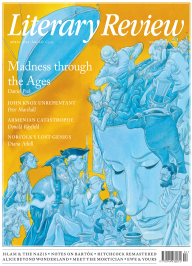Christopher Bray
Singing for Their Supper
We’ll Have Manhattan: The Early Work of Rodgers & Hart
By Dominic Symonds
Oxford University Press 360pp £22.99
What we might call the Whig theory of Broadway history holds that it was only when Richard Rodgers abandoned the increasingly drunken Lorenz Hart to write blockbusters with Oscar Hammerstein II that the musical became a coherent whole. After Oklahoma! (1943) it was impossible to write mere song-and-dance spectacles. Musicals were now unified fields: numbers weren’t just sprinkled incontinently over some feeble yarn; now they grew organically out of a meaningful narrative. This, argues Dominic Symonds in We’ll Have Manhattan, is nonsense. Right from the jump, he says, Rodgers and Hart sought to render story and song indivisible.
In part, this ambition was a reflection of a burgeoning cultural nationalism. Until the end of the First World War, American musical theatre was dominated by Middle European operettas (all noble tenors and no-good basses) and winsome, major-chord snores imported from London’s West End. The powers that be were none

Sign Up to our newsletter
Receive free articles, highlights from the archive, news, details of prizes, and much more.@Lit_Review
Follow Literary Review on Twitter
Twitter Feed
The son of a notorious con man, John le Carré turned deception into an art form. Does his archive unmask the author or merely prove how well he learned to disappear?
John Phipps explores.
John Phipps - Approach & Seduction
John Phipps: Approach & Seduction - John le Carré: Tradecraft; Tradecraft: Writers on John le Carré by Federico Varese (ed)
literaryreview.co.uk
Few writers have been so eagerly mythologised as Katherine Mansfield. The short, brilliant life, the doomed love affairs, the sickly genius have together blurred the woman behind the work.
Sophie Oliver looks to Mansfield's stories for answers.
Sophie Oliver - Restless Soul
Sophie Oliver: Restless Soul - Katherine Mansfield: A Hidden Life by Gerri Kimber
literaryreview.co.uk
Literary Review is seeking an editorial intern.